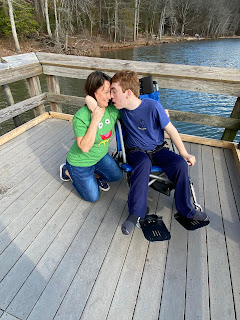At the first place I visited, the social worker’s warning stayed with me: “Don’t wait until you’re in a crisis to have a plan for your adult child with special needs.” She’d recently turned away elderly parents who were hoping to leave their son at the facility. The wait for a bed there was a decade.
Over the past four years, I've toured a few group homes and one facility. I've spoken with more than a dozen in-take staff with agencies specializing in group homes, alternate family living (AFL) placements and intensive care facilities. An AFL is when your child lives with another family or individual who takes care of them in their own home.
Starting early gave me the advantage of working out the emotional turmoil that goes along with placing our son in another living situation. An avalanche of emotions hit me after the first tour of a hospital-like facility. I knew it wasn't what I wanted for Ben but I had no idea what else was available to him.
For four years, I researched places and we still ended up making mistakes. Ben moved into an AFL last August and he returned home in March after several months of dealing with a stressful situation.
Here are suggestions for starting the group home placement process:
Start early. Conducting research does not mean you're placing your child in a group home soon. It just means you're gathering the information needed to make an informed decision. Do an internet search of "group home agencies" in your area and see what comes up.
Ask everyone you know about agencies with group homes. One of the best contacts I made was at a party. Someone who knew someone who worked at a local agency ended up being a great resource for me.
Make a chart to keep track of the agencies you talk to, places you visit, and the results from each conversation. At times, I was in contact with 10 different people and if I didn't have the chart, I would have been lost.
I also recommend keeping a notebook with the date, contact name, phone number and notes from each telephone conversation.
This is what I used but you can customize something that works for your family.
- Who do you know who has gone through the process of finding a group home placement?
- What local and state organizations can help you navigate the system?
- What groups can you join that may offer assistance online or within your local community?
Find out how individuals in your state pay for group homes and other placements.
- Does the state Medicaid program pay for your child to live there?
- How much are the room and board each month?
- Are there any hidden costs?
- Do you have to pay extra if your child needs "wake staff" - someone who will help your child if they need assistance in the middle of the night?
"Parenting an Adult Child with Disabilities" is a series on eSpeciallyBen. As Ben approached 18, it was clear our role changed as parents. We needed to help Ben transition into adulthood. These stories are meant to assist other families who face, or will face, some of the same challenges.
- Talking About the Future
- Guest Post - Matt Wilson
- Legal Guardianship, Medicaid and SSI
- Researching Group Homes
- Questions to Ask at a Group Home Visit
- Referral Packet for Group Homes
- Getting Assistance from a Care Manager
- From Group Home Placement to Discharge
- Reaching for Independence



Thank you so much Vanessa.
ReplyDeleteYou’re welcome. Sharing what we’ve learned in a positive way is my goal.
Delete